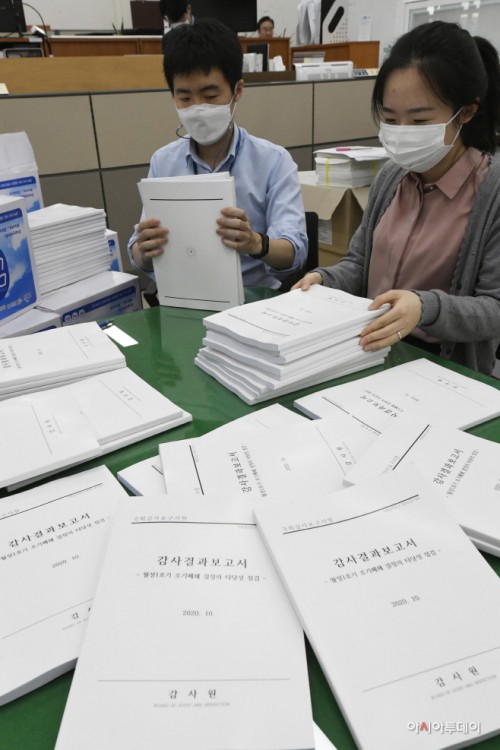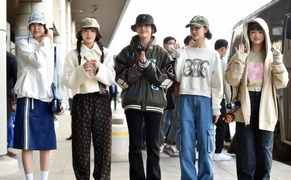 |
| Employees at the National Assembly review an audit report on the early closure of the Wolsong-1 nuclear reactor disclosed by the Board of Audit and Inspection on Oct. 20, 2020. The audit agency revealed that the economic viability of South Korea’s second-oldest nuclear reactor was unreasonably undervalued in determining the facility’s early closure./ Photographed by Lee Byung-hwa |
AsiaToday reporters Lee Seok-jong
State auditors said Tuesday that the economic viability of South Korea’s second-oldest nuclear reactor was unreasonably undervalued in determining the facility’s early closure, however they suspended its judgment on the shutdown decision itself.
While the audit agency did not deny the validity of the shutdown decision as expected, it has concluded that there were problems in the economic evaluation that served as one of the important factors to shut down the Wolsong-1 nuclear reactor before the end of its life cycle, drawing heated debate among politicians over the Moon Jae-in’s nuclear phase-out policy.
In its audit report on the early closure of the Wolsong-1, the Board of Audit and Inspection (BAI) said that its audit focused only on assessing the determining process of immediately shutting down the Wolsong-1 nuclear reactor and the appropriateness of the economic evaluation, and concluded that the future profitability of the reactor was assessed unreasonably low.
“Safety and region-based elements were excluded from the scope of the audit,” the BAI said. “The decision to close the reactor was a result of a range of factors such as safety and regional acceptance, in addition to economic viability. As the inspection was not about determining the validity of the policy decision, it is not appropriate to view the results of this inspection as a comprehensive assessment on the closure of Wolsong-1 reactor,” it added.
“As 11 out of 24 nuclear reactors in operation in Korea are to be shut down by 2030 upon completing their life cycles, the economic evaluation of operation is emerging as an important issue,” the agency said. “It is urgent to prepare relevant guidelines to raise the reliability and objectivity of economic evaluation related to operation of nuclear reactors.”
The BAI revealed that former Trade, Industry and Energy Minister Paik Un-gyu and Korea Hydro & Nuclear Power (KHNP) President Chung Jae-hoon were some of the lead figures responsible for the mishandling of the assessment.
In the case of Paik, the BAI concluded that he had already decided to shut down the reactor even before the feasibility study came out and did not properly consider KHNP’s opinion. The agency also said he did not officially keep the basis data and process of the decision.
In the case of Chung, the agency said that he did not instruct to review various alternatives for the closing period and he did not properly review whether the argument that input variable such as sales figures should be modified was reasonable. The BAI claimed that he also did not supervise KHNP employees who presented inappropriate opinions to an accounting firm, disrupting the evaluation result.
The BAI also found that two Industry ministry officials tried to obstruct its audit process by deleting data and documents concerning the Wolsong-1 reactor.
Therefore, the agency informed Baek’s personnel information to the Industry Minister Sung Yun-mo, and recommended the government to issue a strong warning to the KHNP president.
The BAI also requested the government to punish the two ministry officials who interfered with the audit by deleting documents related to the reactor.
#Wolsong-1 reactor #economic viability #Board of Audit and Inspection
Copyright by Asiatoday
Most Read
-
1
-
2
-
3
-
4
-
5
-
6
-
7





















